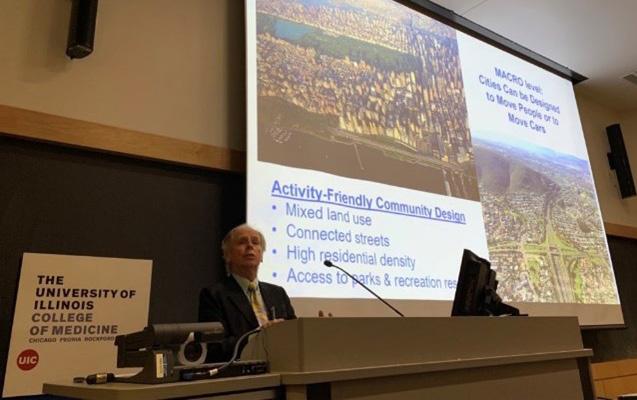
30 minute read
DIVISION HIGHLIGHTS
ACADEMIC INTERNAL MEDICINE AND GERIATRICS (AIM)
The Division of Academic Internal Medicine and Geriatrics (AIM) encompasses general medicine, hospital medicine and geriatric medicine. AIM has been actively growing and developing our clinical footprint, educational efforts, and scholarship.
Clinical
AIM physicians provide general medicine and geriatric care in both the inpatient and outpatient settings. Outpatient care is provided in four on-site clinics and one off-site clinic at the South Loop Physicians Group. In addition, AIM provides geriatric care at three nursing home facilities: Pearl of Hillside (Hillside, IL), Center Home for Hispanic Elderly (Chicago, IL) and Barton Senior Residences of Chicago (Chicago, IL). The division has five robust general medicine inpatient services at the University of Illinois hospital; and runs an observation unit in collaboration with the Department of Emergency Medicine.
Over the past two years AIM has expanded in all clinical areas:
• FY21, AIM welcomed six new faculty members: Drs. Adam Kosloff, Colin Goodman, Jenna Schulte, Christopher Fernandes, Arthur Moswin, and Bhanu Settipalle.
• FY22, AIM welcomed seven new faculty: Drs. Anna Mauro, Erin Hickey, Monique Jindal, Sagar Harwani, Geoffrey Stetson, Awati Neha, and Elisabeth Poorman.
• As a result of the COVID-19 pandemic and closure of a nearby hospital, patient census in the hospital significantly increased over the past year necessitating a 6th general medicine inpatient team (faculty only).
• In May 2021, Geriatric faculty began to provide clinical care at a 4th nursing home, Warren Barr South Loop.
• In May 2021, the Michael Reese Care Program, directed by Arthur Moswin, MD, joined AIM at the South Loop clinic. This group provides comprehensive HIV medical services to adult’s living on Chicago’s South Side.
• In 2021, the 2-Generation Clinic (Director: Rachel Caskey, MD) was established. The 2-Generation Clinic is dedicated to women and children and provides comprehensive medical care, social support and a mental health collaborative care model.
• In 2021, Dr. Erin Hickey initiated 2 new clinics, Transitional Clinic and Adults with Complex Care Clinic, both seeing patients at the South Loop clinic. The Transitional Clinic provides care to young adults transitioning to adult primary care. The Complex Care Clinic provides comprehensive care to adults living with complex medical needs and/or disabilities.
• December 2022, the South Loop Physician Group moved to a newly renovated space, expanding from 6 to 10 exam rooms.
Education
All AIM faculty actively participate in numerous educational efforts at UIC including undergraduate and graduate medical education. AIM faculty hold leadership roles in both the Internal Medicine Residency program and in the medical school. As a whole, AIM faculty contribute more effort to medical school education than any other unit in the College of Medicine.
The Geriatric Medicine Fellowship program at UIC is a one year highly collaborative ACGME-accredited program and is one of the largest programs in the country that provides medical and inter-disciplinary education on normal aging, geriatric chronic diseases, palliative care and evidence-based senior healthcare.
Two fellows, Chaudhary Ahmed and Nikhil Tarte, completed training through our fellowship program in 2021 and 2 fellows, Moustafa Elziny and Christian Nehme, will complete the program in 2022.
The CLASS Fellowship program launched on July 1, 2018, led by Dr. Saul Weiner. The goal of the Clinical Leaders and Academic Scholars (CLASS) fellowship is to graduate collaborative and self-directed continuous learners who identify and respond to the most significant clinical, research and educational challenges in the organizations they serve. The fellowship is designed to develop a set of core competencies, complemented with specialized expertise depending on the track. Three fellows completed the program in 2021 and 3 fellows began the program in 2021, Zoe Haemer and Gabriel Marrero-Rivera are both on the medical education track, and Sam Wainwright is on the research track.
The POCUS (Point of Care Ultra Sound) Fellowship was launched in July 1, 2020. POCUS fellow, Michael Freedman, completed the program in 2021, remained at UIC post-fellowship and is currently a pulmonary disease and critical care medicine research fellow. Two fellows will complete the program in 2022, Xiangyu Xie and Ian Kang.
The Vitoux program in Aging and Prevention, directed by Jun Ma, MD, PhD, who serves as the inaugural vitoux distinguished professor of medicine, focuses on lifestyle interventions to promote healthy aging and disease prevention. The Vitoux program faculty, staff, and trainees are engaged in research on lifestyle and preventative care across the lifespan, education and mentorship and creating evidence-based programs that transform research into practice. The Vitoux program includes multiple research initiatives including the ALOHA trial: Addressing Quality of Life, Clinical Outcomes, and Mechanisms in Uncontrolled Asthma
Following the DASH Dietary Pattern is an active study to evaluate behavioral interventions to promote Dietary Approaches to Stop Hypertension (DASH) among adults with uncontrolled asthma.
Research
In calendar year 2021, AIM welcomed three postdoctoral Fellows, Tristesse Burton, PhD, MSL, Hagar Hallihan, PhD, RN, Ronald Jackson, PhD for the T32 Precision Lifestyle Medicine and Translation
Inaugural Vitoux Distinguished Lecture. James Sallis, PhD presented “Lessons Learned From 20 Years of Research on Built Environments, Physical Activity, Obesity and Equity”
Research (PREMIER) Postdoctoral Training Program (T32 MPI’s: Ma, Caskey). In addition, we have had several experienced research staff join our division (Amruta Barve, Vikas Kumar, Sushanth Dosala and Nancy Wittels) for Dr. Jun Ma’s research study entitled “Study of a PST-Trained Voice-Enabled Artificial Intelligence Counselor (SPEAC) for Adults with Emotional Distress” and the ALOHA trial.
We hired research staff Alia Jamison and Lawrie Zhang for Dr. Caskey’s HRSA grant “Innovations to ImPROve Maternal OuTcomEs in Illinois (I PROMOTE-IL)”.
Monique Jindal, MD, a junior faculty member, was recruited to expand the health services research faculty in AIM. Dr. Jindal completed a fellowship in health equity research at the Johns Hopkins School of Medicine prior to joining UIC.
Elisabeth Poorman, MD joined us after completing an addiction fellowship at the University of Washington School of Medicine. Dr. Poorman is working with Dr. Sarah Messmer and the UI-TEAM: Utilizing Interdisciplinary Training to Educate and increase Access to Medication Assisted Treatment project.
In FY21, AIM received 23 new sponsored awards and AIM faculty had over 70 peer-reviewed publications this year.
Cardiology
Despite the challenges of the COVID-19 pandemic, we have experienced modest growth in the clinical practice in 2020. Over the last year, we have focused on growing the Structural Heart Disease (SHD), CardioOncology, and Inherited Heart Disease (IHD) programs, establishing the T32 research training program, enhancing faculty development and mentorship, and recruiting new faculty.
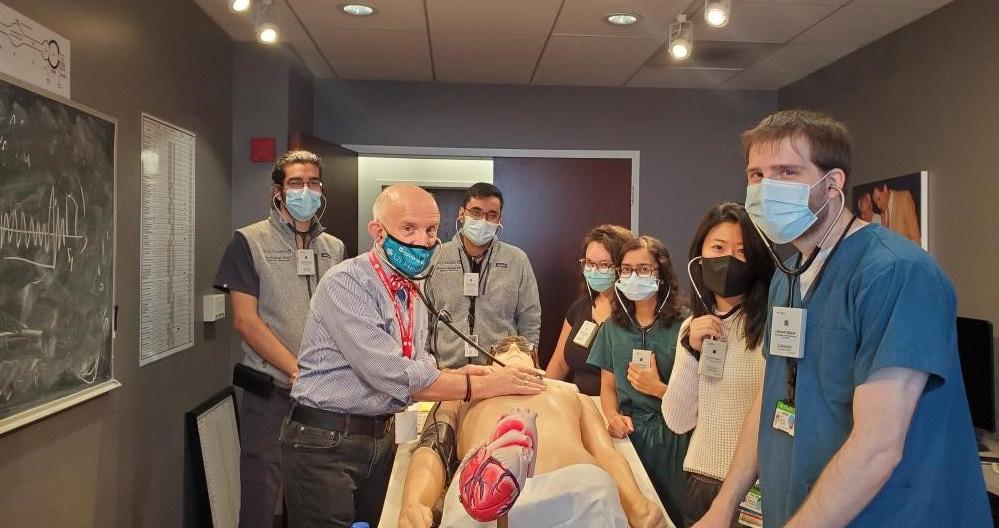
Clinical
Growth in Faculty: We have promoted diversity, equity, and inclusion by recruiting underrepresented minority (URM) and women cardiologists. In 2020, we recruited two of our former chief fellows, Drs. Mary Rodriguez (URM) and Hema Krishna for the vacant noninvasive/heart failure (HF) and SHD imaging positions respectively, a second SHD cardiologist (Dr. Michael Bode), and an experienced electrophysiologist (Dr. Srinath Yeshwant).
Growth in Clinical Practice: We experienced a decline in services, especially over the months of March to June of 2020 due to COVID-19 pandemic with a steady increase towards the end of the calendar year. During this timeframe, professional charges from patient care in the division decreased by 11%, (with a 52% decrease during the COVID-19 shutdown months alone). During the last quarter of calendar year (CY) 2020, the charges increased by 13% compared to CY2019, as our team returned to normal operations.
Innovations in Patient Care: We continue to expand our clinical footprint by establishing innovative clinical care programs and partnering with local community hospitals, JBVA and Mile Square Main Federally Qualified Health Center (FQHC). a) SHD Program: We performed over 75 transcatheter aortic valve replacements (TAVRs), 30 Watchman devices and 15 Mitraclips in 2020. b) Program in Cardio-Oncology: Established in 2018 by Dr. Chris Gans, the CardioOncology Program continues to provide invaluable service to cancer patients. c) IHD Program: This program continues to serve our patients and their families as well as the referring community and enables us to provide high quality clinical care but also conduct clinical and translational research. d) Advanced HF Program: Dr. Gans has partnered with Northwestern University Medical Center to create a joint Advanced HF Clinic at UIC. e) Heart Disease in Women Program: Dr. Joan Briller, Director, continues to broaden the referral base for pregnant women and women with heart disease.
EXCELLENCE IN BASIC, CLINICAL AND TRANSLATIONAL SCIENCE
In alignment with the Center for Cardiovascular Research (CCVR), the division is expanding its research focus to NeuroCV Biology based on a.) existing expertise in vascular biology, metabolism, and stem cell biology; tissue and organoid engineering, metabolomics and single-cell analysis; b.) like CV Disease, cognitive decline and Alzheimer’s disease are key public health challenges associated with significant morbidity and increased mortality; and c.) long-term sustainability of a NeuroCV Biology program as it is becoming increasingly apparent that CV pathologies exacerbate neurodegenerative diseases.
Education
We have created an interdisciplinary training program to mentor predoctoral and postdoctoral trainees in Personalized Medicine. Trainees from Endocrinology, Diabetes and Metabolism, Biomedical Engineering and Stem Cell Biology & Regeneration as well as CV Medicine are developing into the next generation of physician scientists and scientists. The broad applicability of our program has enabled us to recruit fellows from distinguished programs like the University of Chicago and Emory University for the Cardiology Fellowship.
ENDOCRINOLOGY, DIABETES AND METABOLISM
The Division of Endocrinology, Diabetes and Metabolism made substantial strides in our goal to become a leading division in the coming years in clinical and research activities.
Clinical
With support from the department and College of Medicine, we continue to make great strides. While this year has brought continued challenges in the face of the persistent COVID-19 pandemic, our group of physicians and scientists have continued to adapt and met the unique challenge it has presented to us. Important on-going projects have emerged to investigate the relationships between COVID-19 and diabetes, through which we are aiming to define risk factors in these patients.
During this period, we developed a robust Emergency Room Screening program for diabetes. This program diagnoses 300 people a month with prediabetes and diabetes. Our next steps are to develop a plan to integrate these newly diagnosed individuals into primary care and diabetes education classes. We continue to have success of our Diabetes Management Education program and inpatient Diabetes Management program and developed a combined diabetes-nephrology clinic, to manage complex patients. We are actively working to start a promising new development in the Illinois Department of Correction (IDOC) around diabetes care.
Focused on Bone health, we plan to expand our outreach for bone density studies. About 20 percent of referrals for bone density studies come from community providers. Our goal is to reach out to these providers to better serve their patients' needs. In addition, we are reaching out to our internal customers within the UIH community. We expanded our clinical practice into Mile Square clinic and have coordinated with the weight management and islet transplant programs. Our focus is quality improvement for bone health and leveraging the electronic medical healthcare records system.
In FY22, we took over transgender care within IDOC. For each facility within the state of Illinois, we manage their hormonal and medical needs around transgender care with the goal of improving outcomes and better meet the patient's goals.
Research
The division's research program continues to grow. Our federal funding increased from $700,000 in 2016 to over $5 million annually. Our research spans islet biology and transplant programs, adipose functional studies, hepatic metabolism, environmental impact on metabolism, and central nervous systems (CNS) driven mechanism of obesity and diabetes. The divisions' researchers are involved in numerous clinical trials, working with clinical researchers and using emerging technologies including artificial intelligence to address diabetes and metabolism questions that impact patient care and outcomes. Moreover, we are making significant strides to develop a UI Health/UIC diabetes center, which will better consolidate research activities.
Education And Training
All of our faculty participate in the educational efforts of our fellowship program. Our two-year fellowship training program is accredited by the Accreditation Council for Graduate Medical Education (ACGME). Fellows receive educational and clinical instructions from faculty using our inpatient and ambulatory facilities at the clinics and hospital. In addition, they attend weekly, monthly, and annual conferences, and participate in national conferences. Our fellows have published papers and presented posters at the endocrinology society meeting, AACE Illinois Chapter meeting as well as won the National ACE Award.
Gastroenterology And Hepatology Clinical
The Division of Gastroenterology and Hepatology is staffed by physicians and scientists who specialize in the diseases of the liver and gastrointestinal (GI) tract, including diseases of the esophagus, stomach, gallbladder, pancreas, small and large intestine (colon) and rectum. Our team offers specialized care for numerous complex disorders such as: inflammatory bowel disease, short gut syndrome and small intestinal transplantation, gastrointestinal oncology, pancreaticobiliary disorders, and gastroesophageal reflux and swallowing disorders.
The past year was marked by the ongoing Coronavirus pandemic, including the rise of the Delta variant. However, the division has now adapted to the realities of practicing medicine within this environment, including preprocedural testing, social distancing, personal protective equipment, and telehealth clinic visits. After a decline to only 5533 endoscopic procedures in FY 2020, UIC gastroenterologists performed 6793 endoscopic procedures in FY 2021, even more than the 6565 procedures performed in FY 2019. We rebounded from the disastrous onset of the pandemic, and we are poised for increased success as we transition to a new endoscopic procedure suite in the Ambulatory Services Center.
In FY 2021, our endoscopic team continued to explore the leading edge of endoscopic therapies. We now offer endoscopic therapies for weight loss, including intragastric balloon placement and endoscopic sleeve gastroplasty. We are also expanding the use of novel lumen-apposing metallic stents to treat acute cholecystitis or gastric outlet obstruction in patients for whom surgery is not a good option. Our esophageal program now offers EndoFLIP procedures for investigation of swallowing disorders.
We also provide patient care for the treatment and management of all liver disorders, including viral hepatitis (hepatitis B and C), autoimmune liver disease, nonalcoholic fatty liver disease, primary biliary cirrhosis, primary sclerosing cholangitis, hepatocellular carcinoma, liver lesions, alcohol liver disease, cirrhosis, and patients in need of liver transplantation. Teams of expert physicians at the Bobbie and Marvin Fink Liver Clinic and the Walter Payton Liver Center bring innovative care, scientific collaboration and patientfocused methods to combat liver diseases. We provide dedicated inpatient and outpatient care to GI and liver patients of Illinois and beyond and also provide hepatology services at four clinics outside Chicago.
Liver Transplantation
The UI Health Liver Transplant team is one of the most experienced and innovative programs in transplant and research in Chicago and the region. Our center is a pioneer in living-donor liver transplantation. Our hepatologists work closely with a team of pharmacists and mid-level providers to take advantage of new treatments for liver disease and develop the best treatment plans for patients. Unlike other transplant programs, we closely monitor and provide one-on-one care throughout the entire transplant process, from the pre-transplant workup to postoperative care. Our team strives to provide culturally sensitive care to all ethnicities, races and religions, providing the best experience possible for the patient and their family. For the third straight year, UIC has performed over 50 liver transplants and we seek to grow the program further.
Research
Our research encompasses a broad array of investigations with particular focus on epithelial transport and diarrheal disorders, GI cancer research, host-pathogen interactions and gut microbiota, inflammation and nutrition and metabolism. We are fortunate to have garnered substantial extramural funding, including government and private foundations sources as well as philanthropy.
Fellowship
We offer 1-4 fellowship positions each year, for highly qualified applicants seeking the highest quality training in all aspects of gastroenterology and hepatology. Our program is distinctive because of its commitment to provide the fellows with:
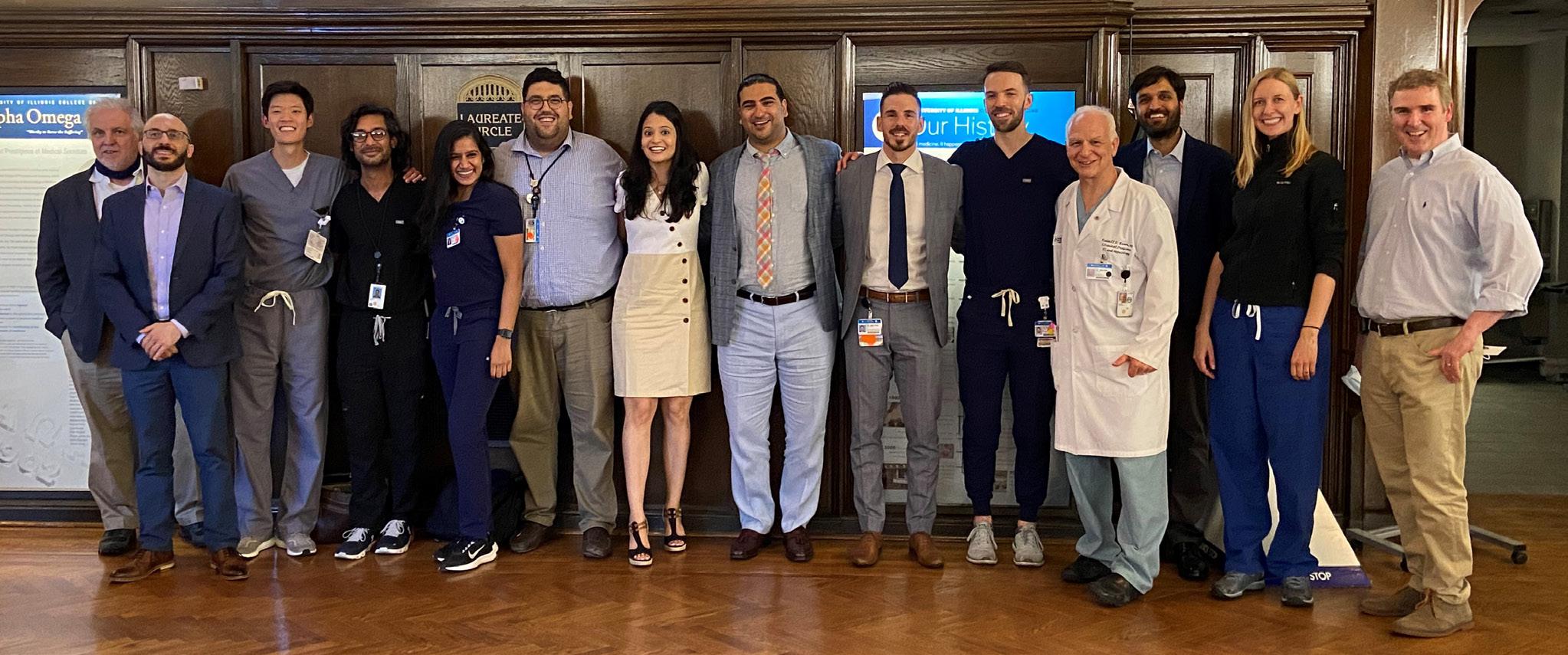
• The opportunity to learn all diagnostic and therapeutic procedures.
• An intensive exposure to all aspects of clinical hepatology, including transplantation.
• The ability to obtain additional formal education, including a Masters of Public Health (MPH) degree.
• Exposure to clinical, bench and translational research opportunities.
Fellowship training is provided by full-time faculty who are clinical, translational and basic science investigators and who are experts in their particular subspecialties. Fellowship graduates are skilled in endoscopic procedures, as well as the art of providing consultation and expert care for complex patients. Our program is fully accredited by the Accreditation Council of Graduate Medical Education (ACGME). We also offer advanced fellowship training in areas including transplant hepatology and advanced endoscopy.
Advanced Endoscopy Fellowship - The Advanced Endoscopy fellowship is a one-year curriculum of intense immersion in therapeutic endoscopy. The trainee maintains a junior faculty position and gains exposure to specialized procedures treating patients with pancreaticobiliary disorders and GI cancer, as well as managing the consult service for pancreaticobiliary disorders. Trainees complete the program with a skillset that includes endoscopic retrograde cholangiopancreatography, endoscopic ultrasound, luminal stent placement, resection techniques to large polyps and masses, and deep enteroscopy.
Transplant Hepatology Fellowship
The Transplant Hepatology Fellowship program at UIC offers one fellowship position each year for highly qualified physicians dedicated to obtaining high quality training in Transplant Hepatology. Fellows are exposed to ambulatory pre and post-transplant clinics, inpatient transplant hepatology, inpatient transplant surgery, interventional radiology, and clinical hepatology.
2021 Fellowship Graduates
Past graduates have gone on to practice in academic settings across the country. Our 2021 graduates, Mitali Agarwal, MD, is now at the Cleveland Clinic for IBD fellowship and Najib Nassani, MD, MS, is now at the University of Chicago for an Advanced Endoscopy Fellow position. Our Advanced Endoscopy fellow, Constantine Melitas, MD, is now practicing at the Arroyo Grande Community Hospital in Arroyo, CA.
HEMATOLOGY/ONCOLOGY (HEM/ONC)
The Division of Hematology/Oncology has been growing its clinical and research work in each of its main programs, Hematology, Bone Marrow Transplant (BMT) & Cellular Therapy (CT), Medical Oncology and Sickle Cell Disease. Seven new faculty members were recruited in 2021, increasing not only the overall number of faculty but also the diversity of the team.
Clinical
The division now has multiple tumor-focused working groups that are instrumental for providing cancer patients with the most accurate clinical approach by selecting new clinical trials, initiate or participate in translational research, engage other key providers in surgery, radiation therapy or pathology. The main working groups include: breast cancer with Drs. Hoskins, Danciu, Gadi and Ibraheem; lung, head and neck cancer with Drs. Feldman, Weinberg and Mary Pasquinelli, APN, PhD; GI with Drs. Jain and Chen, heme malignancy with Drs. Rondelli, Quigley, Khan, Patel, Rubinstein and Uzoka. Other faculty, such as Dr. Reizine and Dr. Ho collaborate very actively with surgical departments in genitourinary cancer and sarcoma, respectively. In FY 2021, the BMT&CT program treated its first 5 patients using chimeric-antigen T cells (CAR-T) against CD19+ B cells present in NonHodgkin lymphomas or acute lymphoblastic leukemia.
Among the many clinical highlights of the division, the recruitment of Dr. Paul Rubinstein brought to UIC a nationally recognized program for HIV related malignancies, particularly lymphomas, with the opening of new clinical trials, as well as translational research projects. Within the Section of Medical Oncology, Dr. Kent Hoskins led a team of investigators in a seminal work on the Molecular Characterization of Luminal Breast Tumors in African American Women that was selected for an oral presentation at the 2021 American Society of Clinical Oncology meeting last June, and a related study was published in JAMA Oncology.
The HEM/ONC Genetics Team initiated an ongoing Hereditary Cancer Tumor Board. These meetings are a unique feature for oncology genetics programs and were initiated to improve oncology genetic patient care by increasing multispecialty integration and discussion of complex cases, and to expand cancer genetics educational opportunities among faculty and trainees. The creation and continuation of this tumor board was used as the 2021 annual programmatic goal for the UI Health Cancer Committee for accreditation by the Commission on Cancer, receiving accolades from the committee for patient care and provider development. These twice monthly Hereditary Cancer Tumors Boards have recently been made available to a variety of learners, University wide, to increase cancer genetic education.
Global Health
The Annual Global BMT Training Program for physicians in Low Middle Income Countries (LMIC) was held remotely due to the pandemic. From October 2020 to March 2021, 32 physicians from Argentina, Bolivia, Cuba, Dominican Republic, Ethiopia, Greece, India, Nepal, Nigeria, and Ukraine could attend 14 live lectures delivered by our BMT team and followed by Q&A. In November 2021, Dr. Rondelli visited Civil Service Hospital in Kathmandu (Nepal) and Ramaiah
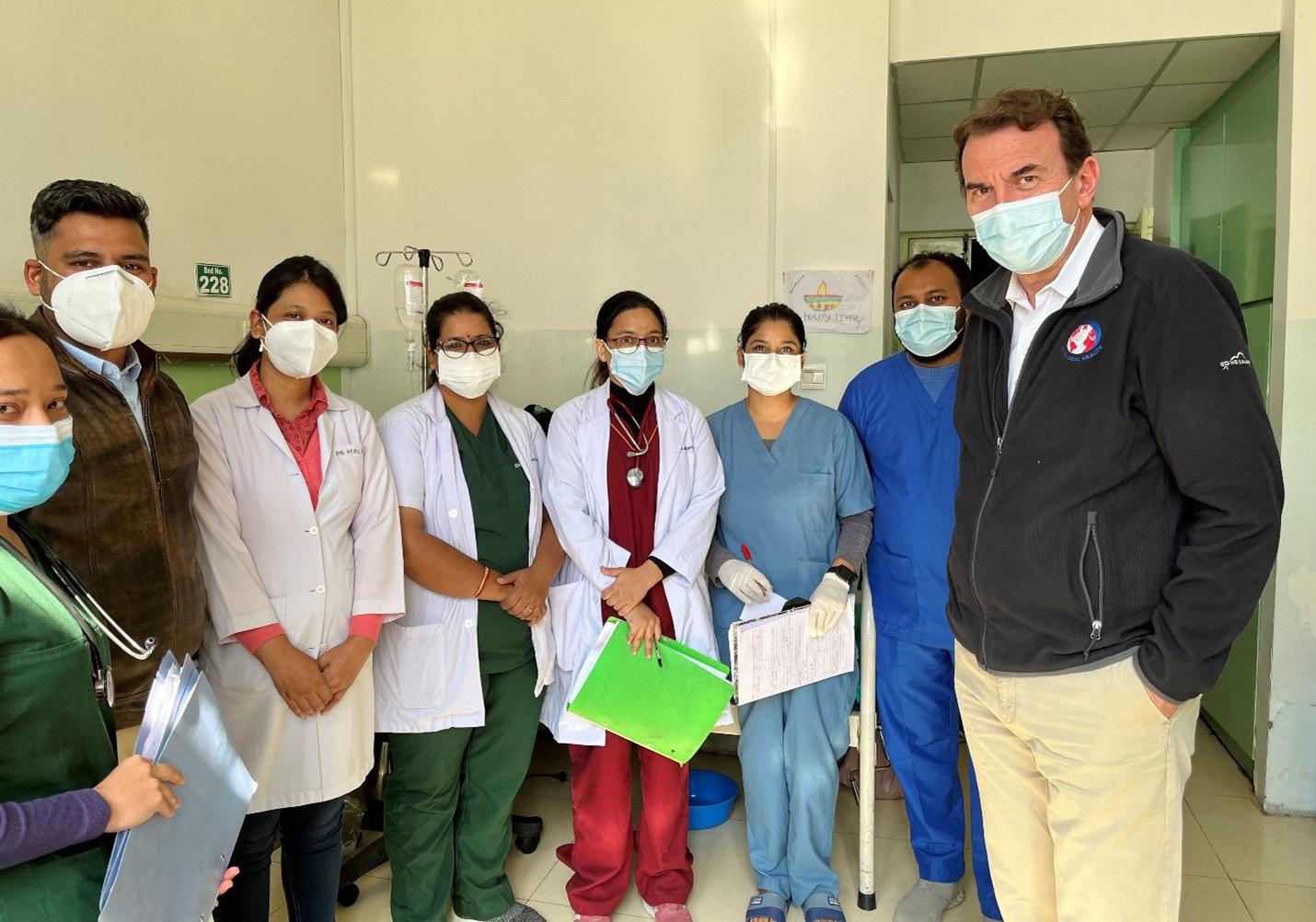
Medical College in Bangalore (India) to give lectures and share rounds with faculty and fellows.
A Global Health project in breast cancer was started in 2021 thanks to Dr. Ibraheem who joined the Division of HEM/ONC to develop her research on implementation of clinical trials in breast cancer in Nigeria.
Research
Members of the division authored or co-authored 63 peer reviewed publications in 2021, and 14 of these in very high impact factor (IF >10) journals, such as The New England Journal of Medicine, Nature Communications JAMA Oncology, Journal of Clinical Oncology, Journal of Clinical Investigation, Blood, and the American Journal of Hematology.
The first part of 2021 was still challenged by many patients with COVID-19 infection. Hematology/ Oncology patients were continuously followed and treated for their primary disease both in the outpatient and inpatient setting. In addition, members of HemOnc were actively involved in a multidisciplinary research project related to COVID-19, that led to important publications and a conspicuous NIH grant to UIC. This included a sub-grant to Dr. Quigley as the leader of studies on thrombotic complications in patients admitted to UI Health for COVID-19. Our division was also an active part of a national research project analyzing the outcome of cancer patients affected by COVID-19, thanks to the effort of Dr. Feldman and our chief fellow Dr. Ryan Nguyen.
The Sickle Cell Center led by Dr. Gordeuk and including Drs. Saraf, Molokie, Njoku, Hussain, Farouqui and Rizvie, had extensive scholarly productivity. Dr. Saraf was awarded an RO1 grant for his basic science research on the effects of sickle cell in renal function. As a result of the close interaction between the Sickle Cell team and the BMT&CT, our center is part of a worldwide consortium limited to a small group of centers that were involved with the design of the first Clustered Regularly Interspaced Short Palindromic Repeats (CRISPR) clinical trial in patients with sickle cell disease. CRISPR technology was utilized to delete the BCL11A gene in patients’ hematopoietic stem cells in order to restart the production of fetal hemoglobin (HbF). Dr. Rondelli was a co-author of the report in the New England Journal of Medicine with the first two patients followed for 12 months after being cured with CRISPR technology.
INFECTIOUS DISEASES (ID)
The Division of Infectious Diseases faculty serves in leadership roles for the hospital, college, as well as University-wide response, and have ongoing contract agreements with both Chicago Department of Public Health (CDPH) and Illinois Department of Public Health (IDPH) to provide consultative support and direct services. We continue to actively engage in national and international, federally funded cutting edge clinical research to treat and prevent COVID-19. As we have adjusted to life in a pandemic, we continue to maintain our other research, educational, clinical, and service missions with both local community and global activities.
Coronavirus Pandemic
The entire ID faculty continues to be engaged in the response to COVID-19. Susan Bleasdale, MD, as director of infection control and chief quality officer for UI Health, with the assistance of Scott Borgetti, MD, assistant director of infection control, continues to lead the medical center at large on policy changes to the evolving pandemic. While the routines in the medical center continue, they have worked tirelessly behind the scenes to keep up with changes in infection control guidelines and treatment practices.
Hiv Disease
Richard Novak, MD, is the director of the UIC Community Clinic Network (UCCN), with six community-based clinics located in the highest prevalence communities in Chicago serving about 1,200 active patients with HIV. The UCCN has been in operation since 1992 with continuous federal funding. These clinics offer comprehensive services including case management, outreach, mental health, pharmacy, women’s health and clinical care. Our community presence addresses health disparities and offers a unique training experience for our trainees. In partnership with the Department of Emergency Medicine’s opt out HIV screening program, we provide linkage to care for all patients diagnosed with HIV in the medical center. Many ID faculty are actively involved with this program.
Max Brito, MD, MPH, received a Health Resources and Services Administration (HRSA) award this year entitled USTART, to engage people newly diagnosed with HIV into care, and rapidly initiate treatment, or re-engage those lost to follow up.
Andrew Trotter, MD, MPH focuses on HIV care, HIV prevention, viral hepatitis, and sexually transmitted infections. He worked with Dr. Novak as a coinvestigator in the CDC-funded Network Epidemiology of Syphilis Transmission (NEST) study and worked on the HVTN 706/MOSAICO HIV vaccine study, HPTN 083 HIV prevention study, in addition to being a consultant in a HRSA grant partnering with the UIC Mile Square clinics to expand access and uptake of HIV PreExposure Prophylaxis. Dr. Trotter continues to work as the co-chair of the Chicago Department of Public Health’s Syphilis Task Force.
Project Wish
Project Wish is our clinical research center which for decades primarily focused on HIV prevention trials and STI clinical research. Since the onset of the COVID-19 pandemic, COVID-19 research has overshadowed the
HIV clinical trials. We are currently working with the Covid-19 Prevention Network (COVPN), HIV Vaccine Trials Network (HVTN), HIV Prevention Trials Network (HPTN), Division of Microbiology and Infectious Diseases (DMID), CDC and others.
Urban And Global Health
Max Brito, MD, MPH, is the chief of infectious diseases at the Jesse Brown VA Medical Center. He currently leads the Chicago Latinx Task Force, a partnership of international consulates, academia and community organizations that aims to help deliver the prevention message on the COVID-19 epidemic to Latinx communities in Chicago.
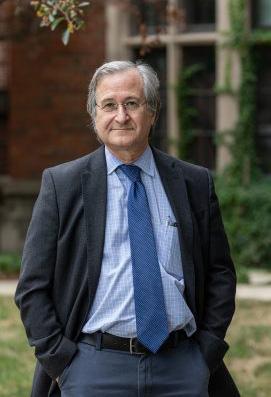
Dr. Brito developed and leads an extramural Global Medicine elective, based in the Dominican Republic, to educate trainees on tropical infectious diseases, social determinants of health and the practice of medicine in resource-constrained settings. The 2-week trip includes a series of lectures on tropical medicine and global health and rounds with the ID services of two hospitals. More than 130 trainees have participated in the Department of Medicine’s Global Medicine elective over the past 18 years. Dr. Brito was recently elected to the board of directors of the Infectious Diseases Society of America.
Geri Donenberg, PhD, directs the Center for Dissemination and Implementation Science and the Healthy Youths Program. In 2021, she was the principal investigator and co-investigator on 10 NIH-funded grants and the co-director of a Fogarty International Training grant. Her work spans 4 countries in SubSaharan Africa, Indonesia, and the United States. She has over 130 peer-reviewed publications underscoring the impact of individual, social, and structural determinants on sexual and reproductive health, mental health, and substance use in adolescents and young adults, implementation science, and HIV prevention and intervention outcomes for youth and families. In 2021, she served as the primary mentor on 8 funded projects.
Vijay Yeldandi, MD, is a member of the urban global health team and spends most of the year in India. Dr. Yeldandi works with multiple hospitals (Hyderabad, India) on design and implementation of patient safety and infection control programs. He provides technical support to the National AIDS Control program, ministry of health and family welfare, and Government of India for improving care of HIV and tuberculosis. Under a cooperative agreement with the CDC, he is developing implementation strategies for “Prevention of airborne transmission of tuberculosis” in the government hospitals in Mumbai as well as HIV treatment centers in India. He directs the “Global Health Education” program at SHARE MediCiti in Hyderabad India, which was the site for a project on “Hands only CPR” executed by UIC residents as part of the urban global health program.
Stockton Mayer, DO, partners with the School of Public Health and the School of Nursing to deliver care to People Who Inject Drugs (PWID). The program aims to deliver comprehensive care to PWID, treating Opioid Use Disorder, skin and soft tissue infections, and Hepatitis C, among other illnesses. In July 2021, Dr. Mayer and his collaborators received SUPR funding to expand mobile van services. The multidisciplinary team offers 6 days of clinical services from its mobile van, distributing buprenorphine in strategic locations on the city’s west side. This upcoming year, Dr. Mayer will lead the section’s advanced fellowship in Infectious Disease and Opioid Use Disorder. Internationally, Dr. Mayer continues to make regular journeys to rural Guatemala to provide training for local physicians in HIV medicine. He works closely with the Jalapa Department of Public Health in Guatemala to deliver HIV services in the Jalapa community - the first HIV clinic in this region of the country.
Infection Control And Antibiotic Stewardship
Susan Bleasdale, MD, is a lead investigator for a study to reduce surgical site infections as part of the CDC Epicenters for Prevention of Healthcare Associated Infections (HAIs).
As the medical director of Infection Control and Antimicrobial Stewardship at Saint Anthony Hospital (SAH), Alfredo Mena Lora, MD, works with Dr. Bleasdale on implementation research. Dr. Mena Lora also works on defining antimicrobial resistance and antimicrobial use in his native Dominican Republic, where he has reported on multi-drug resistant organisms in the community and in various local hospitals.
Gus Alonto, MD, is the director of Infection Prevention and Control Department at Jesse Brown VA (JBVA), as well as the Antibiotic Stewardship program physician champion at JBVA. Dr. Alonto led the COVID-19 response and implemented the COVID-19 protocols and procedures for JBVA Medical Center and its community-based outpatient clinics.
Office Of Health Literacy
Paula Allen-Meares, PhD, is the director of the Office of Health Literacy which provides education and training to the College of Medicine and the UIC health system. During the COVID-19 pandemic, Dr. AllenMeares worked with the objective of training credible messengers to bring accurate information about the COVID-19 vaccine to our communities.
Dr. Allen-Meares serves as a Co-PI for the Rockford Citywide Health Literacy Initiative that aims to evaluate and address health literacy, COVID-19 vaccine hesitancy and general mistrust of the healthcare system among African American/Black and Hispanic/ Latinx adults that live in the identified zip codes (61101, 61102 and 61104) through the context of social determinants of health.
In 2021, the UIC Office of Health Literacy received a two-year sub-award to collaborate with the Center for Disease Control (CDC) and the Cook County Department of Public Health (CCDPH). Dr. AllenMeares leads a team that is tasked with providing health literacy and cultural humility training for the CCDPH staff and community-based organizations who are partnering with CCDPH for this initiative.
Dr. Allen-Meares serves as a Co-PI for the UIC DPI funded “Developing and Evaluating a Contextualized Dialogue Agent to Promote Health Literacy: Addressing Health Disparities Among Urban African American and Latinos with Heart Failure”. She also serves as a Co-I for the Chicago Center for Health Equity Research (CHER) grant and the NIH UIC Behavioral and Biomedical Science Bridges to Baccalaureate Grant. Dr. AllenMeares is an elected member of the National Academy of Medicine.
Telehealth
The HIV/AIDS and Hepatitis C (HCV) telemedicine program, is a partnership with Illinois Department of Corrections. Mahesh Patel, MD, directs the UIC telemedicine effort, providing telehealth to the 26 state correctional facilities in Illinois, serving 500700 patients. This program facilitates continuity of care when our patients are released back to their communities. During the pandemic, Dr. Patel worked on early evaluation of nursing home and correctional center outbreaks of COVID-19 under the IDPH contract. He serves on the medical school curriculum committee for the M2 year, and was honored with a Golden Apple award by the students, which he has received multiple times.
Parasitology
Lelia Chaisson, PhD, MSc, current research, based in Brazil and Uganda, focuses on implementing novel strategies to improve diagnosis of tuberculosis (TB) infection, uptake of TB preventive therapy, and adherence to TB preventive therapy for people living with HIV. From 2020-2021, she served as a researcher for the World Health Organization Guidelines Development Group on Systematic Screening for Tuberculosis. As a core faculty member of the Center for Global Health, Lelia also serves as a mentor for students in the Global Medicine (GMED) program.
Nephrology Clinical
The Division of Nephrology provides clinical services for the evaluation and treatment of the full spectrum of kidney diseases, hypertension, and fluid-electrolyte disorders, with a strong commitment to serving minority populations. At the University of Illinois Hospital, the division provides over 4,000 dialysis treatments per year. Faculty and fellow-staffed outpatient clinics accommodate up to 100 patients per week. The division has a robust program for outpatient in-center and home dialysis which is based at the University and at a nearby Fresenius Medical Care unit. The division has a comprehensive multidisciplinary Chronic kidney disease (CKD) education program for English and Spanish speaking patients.
In collaboration with the Division of Endocrinology, the Division of Nephrology launched a new Diabetes Kidney Health Clinic in January of 2021. Diabetes and CKD are among two of the most prevalent co-morbid chronic diseases in the US. Given the increasing complexity of health-care delivery for people with these conditions, there is a clear need to integrate across specialty health services. With the development of new therapies for patients with diabetes and kidney disease, we anticipate that this new partnership will have a positive impact on the care of our patients. This multidisciplinary clinic is led by Drs. Ana Ricardo of Nephrology and Kristen Decarlo of Endocrinology.
The Division of Nephrology excels in providing care to transplant patients. Led by Dr. David Perkins and four full-time faculty members, the transplant nephrology service provides comprehensive care staffing both outpatient and inpatient services. In 2020-2021, the transplant program performed the highest number of kidney transplants in the United Network for Organ Sharing Region 7, with over 300 kidney transplants. The program also did highest number of pancreas transplants in the US. The program is known for its expertise in obese and high immunological risk patients.
Education
The division has a strong commitment to training the next generation of clinicians and researchers in nephrology. The Nephrology Fellowship Program is one of the largest in Chicago providing a rich exposure to the full spectrum of clinical nephrology with training at three large public hospitals. Rotations take place at the University of Illinois Hospital and Jesse Brown VA Medical Center. In addition, trainees rotate at John H. Stroger, Jr. Hospital of Cook County, which has had a long-standing academic affiliation with the division.
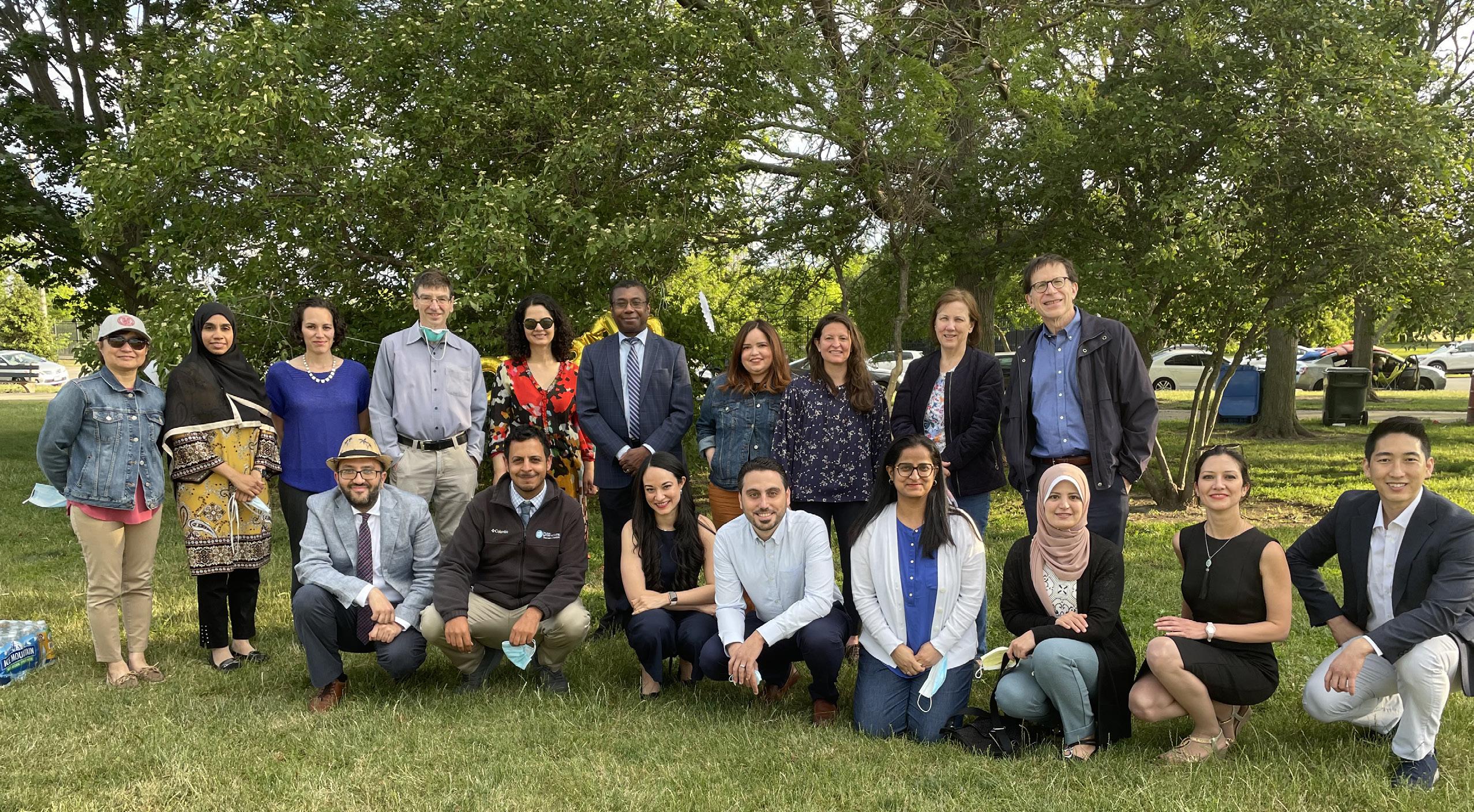
Nephrology fellows have consistently been top prize winners at the National Kidney Foundation of Illinois Controversies in Nephrology annual debates. Nephrology fellows Drs. Kirolos Iskander and Anas Kizawi were second place winners in the 2020 debate which was focused on treatment with peritoneal dialysis as a first line of treatment for patients requiring renal replacement therapy.
Nephrology fellows also have access to a recently funded research training program. This NIH-funded inter-institutional training grant offers research training in kidney diseases, benign urology and hematology. The program provides training for both pre- and postdoctoral fellows. Nephrology fellows are also able to enroll in the School of Public Health Master of Science in Clinical and Translational Science program. The division has had significant success in transitioning trainees to academic positions.
Research
The Division of Nephrology operates the largest clinical research program in kidney disease in the Chicago area with a prominent focus on health disparities. Ongoing research studies include the NIH sponsored Chronic Renal Insufficiency Cohort (CRIC) Study, Hispanic CRIC, Mexican CRIC, and the Hispanic Community Health Study/Study of Latinos. The division also has active basic and translational research programs focused on cell biology, autoimmunity, acute kidney injury, integrative systems biology and bioinformatics.
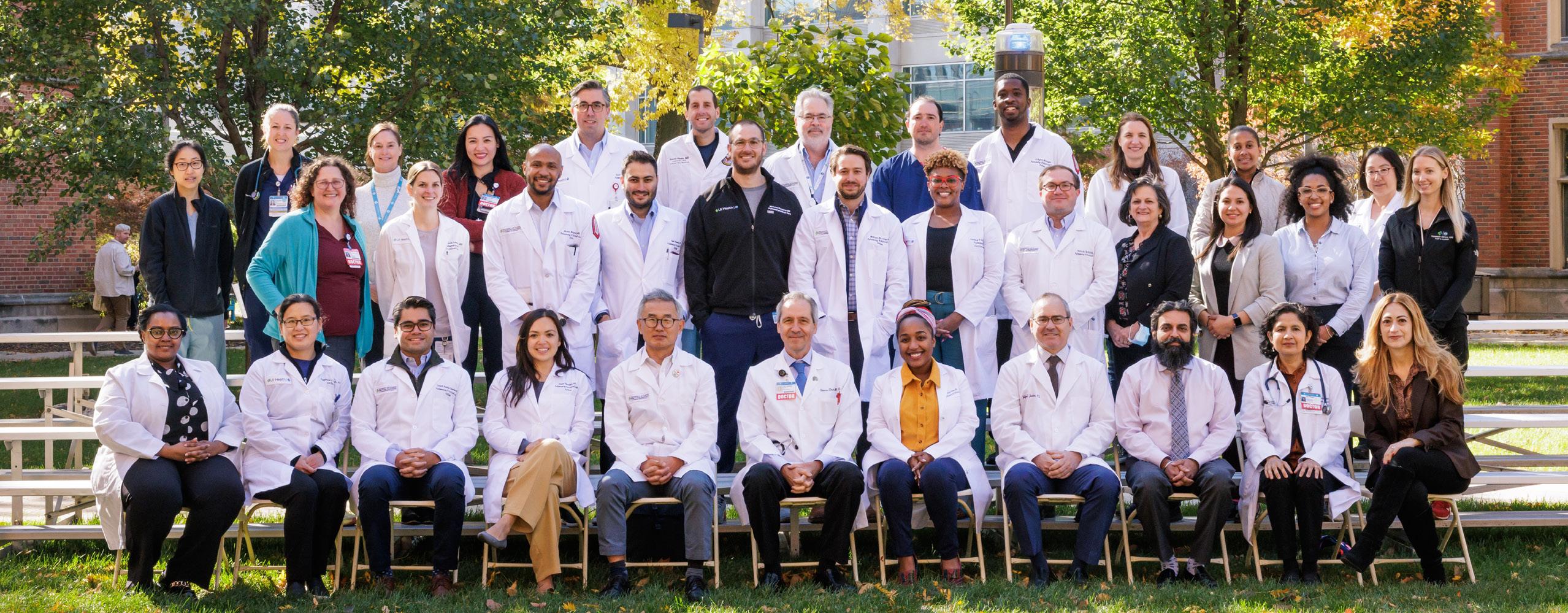
Other ongoing major NIH studies include Dr. Ana Ricardo’s R01 which is evaluating the impact sleepdisordered breathing on the progression of chronic kidney disease; and Dr. Michael Fischer’s U01 study which is investigating non-opioid pain management strategies for people on hemodialysis. Dr. Stephanie Toth-Manikowski was supported by an NIH Research Supplement to Promote Diversity in Health-Related Research to study the impact of access to health care in Hispanics with chronic kidney disease, and she also received a National Kidney Foundation of Illinois Young Investigator award to conduct a pilot study evaluating the impact of cognitive behavioral therapy on insomnia in patients in CKD.
PULMONARY, CRITICAL CARE, SLEEP & ALLERGY
Despite the challenges of the ongoing COVID-19 pandemic, the Division of Pulmonary, Critical Care, Sleep, and Allergy has continued to advance the mission of the Department of Medicine along multiple fronts, including clinical care, scholarly activities, educational endeavors, and service. The division continues to evolve and grow and is now one of the largest divisions in the Department of Medicine, consisting of 37 faculty and 18 fellows.
Clinical
The division provides many valuable and essential clinical services to our institution’s patients and is honored to participate in the care of the underserved patient population that comprises the majority of those receiving healthcare at UI Health and the Jesse Brown VA Hospital. An important priority is expanding access to the medical services we provide for these patients. Our clinical operations at UI Health and the Jesse Brown VA continue provide the highest quality care to hundreds of patients each week. Our sleep medicine, allergy, and interventional pulmonary programs, in particular, have seen significant clinical growth in recent years. In 2021, our Interventional Pulmonology program introduced state-of-the-art robotic bronchoscopy here at UIC. Vibrant sub-specialty clinics are devoted to sleep medicine, allergy, pulmonary hypertension, lung nodules, bronchiectasis, sarcoidosis, and COPD. The Lung Cancer Screening program continues to grow and provides an invaluable service, particularly for our most underserved patients.
Education
The educational mission of the division is to train and develop leaders in the fields of pulmonary medicine, critical care, sleep medicine, and allergy. The division houses three high quality fellowship programs that are fully accredited by the Accreditation Council for
Graduate Medical Education (ACGME)—Pulmonary and Critical Care Medicine, Sleep Medicine, and Interventional Pulmonology, our newest fellowship program that began in FY2019. These training programs are thriving in terms of demand, curriculum growth, and graduate success. Our division has a highly successful NIH T32 training program for developing future leaders in pulmonary-related research. Fellows trained in this program have earned multiple NIH K awards in the recent past and constitute the physician-scientist leaders for the next generation. The educational success of our division is also reflected in the multiple teaching awards earned by our faculty.
Scholarly Activities
Our faculty are nationally and internationally recognized as leaders in their respective fields. Division members are highly engaged in advancing the science of practice of medicine with diverse areas of expertise including vascular biology, immunology, clinical outcomes and implementation research spread across pulmonary, critical care, sleep and allergy specialties. We have a very active portfolio of research projects, funded by the National Institutes of Health, VA system, American Hospital Association, and various other private foundations and pharmaceutical companies.
In FY2021, the total number of active external grants was 54, including 10 new awards received in the past year. Our entire grant profile now totals more than $31 million annually (direct and indirect funding). The highly productive members of the division published more than 130 original scholarly works in FY 2021, including multiple publications in high impact journals. This active scholarship produces many collaborative pursuits within the departments of Medicine, Pharmacology, the School of Public Health, and others here at UIC which have generated national and international recognition. We are particularly proud of our success in training and nurturing the next generation of pulmonary-focused scientists, with our division earning multiple NIH K level Career Development awards in the past several years, which pursued important research questions relevant to a diverse array of clinical problems—asthma, ARDS, pulmonary hypertension, and COPD.
Service
Our faculty serve on numerous committees and other service and leadership positions that positively impact the Department of Medicine, College of Medicine, University, and the community at large. These include multiple clinical directorships (MICU, PFT laboratories, sleep center, etc.), educational leadership (program director, competency committees, leadership of research training grants, etc.), departmental and hospital administrative roles, campus-wide committees, community education and volunteer service, and national and international professional organization leadership. Through these efforts the members of our division positively affect change throughout the University and the communities we serve, while at the same time raising the profile and reputational status of our institution.
Rheumatology
The Division of Rheumatology is dedicated to promoting excellence in clinical care, research, and education. We are fully committed to our mission of service to minority patients and educating future rheumatologists while pursuing scholarly activities. The division is well known internationally for expertise in sarcoidosis and rheumatoid arthritis.
approach to treating systemic sarcoidosis. The sarcoidosis team of experts are motivated through innovative care and collaboration to provide the best experience for each patient. Lori E. Lightfoot, Mayor of the City of Chicago, designated April 21, 2021 to be Sarcoidosis Day in Chicago to raise awareness about sarcoidosis and encourage all residents to support the Bernie Mac Foundation.
Dr. Huan Chang is leading clinical efforts in osteoarthritis. Dr. Pim Jetanalin is leading the clinical efforts in lupus and gout. Dr. Mina Al-Awqati is leading the clinical efforts in myositis and connective tissue disease associated in interstitial lung disease and Dr. Shiva Arami is leading clinical efforts in scleroderma.
In FY21, rheumatology's clinical volume rose by 14% as compared to FY20.
Research
Clinical
The Division of Rheumatology is staffed by physicians who focus on clinical care of patients with complex rheumatologic disorders. The division provides patient care and management for all rheumatologic disorders including rheumatoid arthritis, system lupus, inflammatory eye disease, vasculitis, myositis, systemic sclerosis, osteoarthritis, crystal arthropathies, behcet’s syndrome, antiphospholipid syndrome, interstitial lung disease and sarcoidosis.
Dr. Nadera Sweiss, the founder and director of the Bernie Mac Sarcoidosis Translational Advanced Research (STAR) Center leads the multidisciplinary
The division is involved in basic, clinical, and translational research, funded through the National Institutes of Health, the Department of Veterans Affairs, the Foundation of Sarcoidosis Research (FSR), Bernie Mac STAR Center, national research organizations, industry and philanthropy. Dr. Shiva Shahrara leads the efforts of translational research in the field of rheumatoid arthritis. These studies determine novel targets that inhibit neovascularization, leukocyte migration and bone erosion in the RA joint and identify biomarkers that reflect RA disease severity and/or response to effective treatments. Dr. Nadera Sweiss leads the efforts in clinical trials in sarcoidosis and several landmark studies in rheumatoid arthritis and sarcoidosis.
Education
The Division of Rheumatology has a strong education program for fellows, residents, and medical students. The division offers two fellowship positions each year. Fellows are trained in various aspects of clinical rheumatology as well as clinical and translational research. Dr. Shiva Arami is the interim program director.
The University of Illinois Chicago Department of Medicine is committed to high-quality care for all, scholarly activity, and education. The Department of Medicine is dedicated to increasing the diversity of the clinical, research and educational workforce.
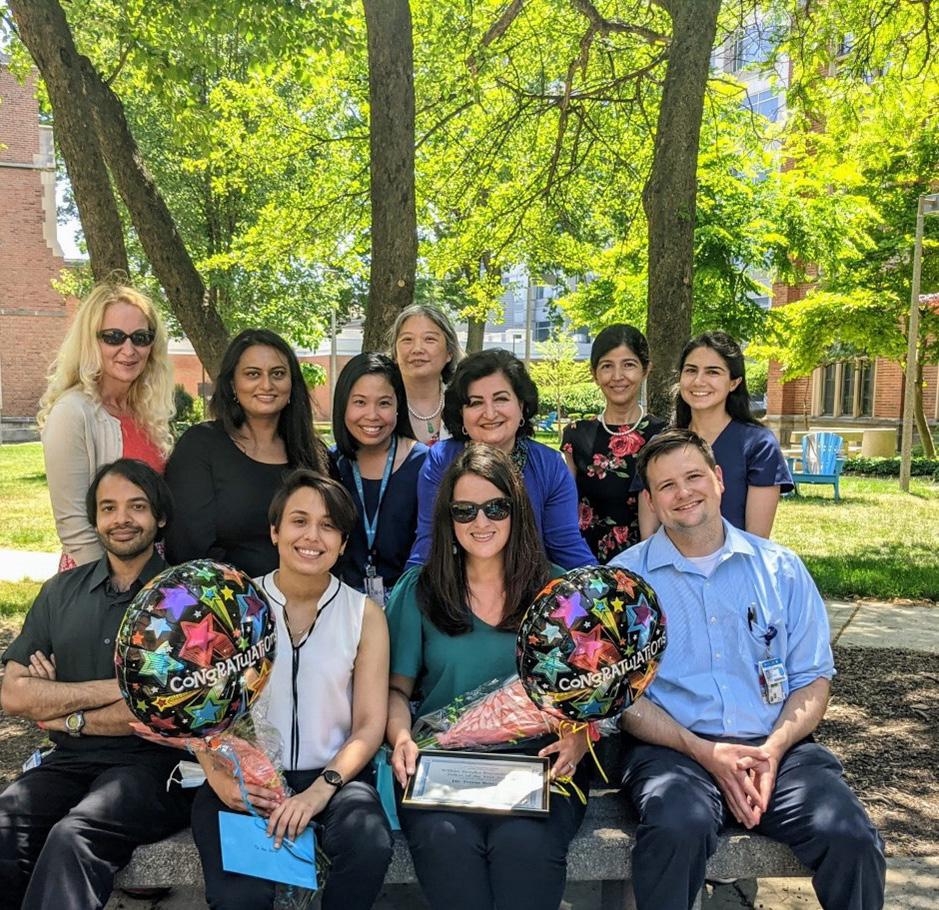

We invite you to visit our giving website. Your gift to the Department of Medicine brings us closer to our goal of providing state of the art medical care to all, excellent training to the next generation of physicians, innovative programs and conduct groundbreaking research. Please consider making a gift today.
To give please visit our website at https://go.uic.edu/givedom.
Contributors/Reviewers:






